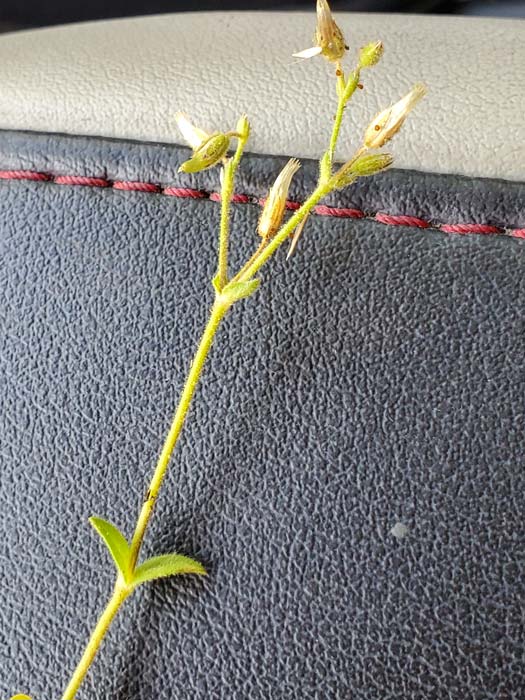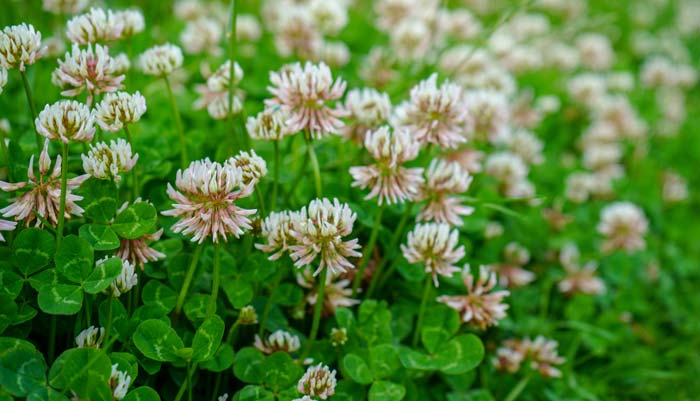2 common spring weeds: clover and sticky chickweed
Throughout the spring you’ll see many different weeds in your lawn, but likely some more than others. Being able to identify some common weeds can help you better control them. For example, in a previous blog post, we talked about two pesky annual weeds: Hairy bittercress and Dandelions. Both weeds are prevalent in the spring, but many homeowners grow frustrated when they’re not able to completely suppress the weeds so they never re-emerge…both impossible tasks by the way. Understanding how and when weeds grow can ensure you’re attacking them the right way and at the right time of year.
In this post, we’ll tackle two more common spring weeds: Sticky mouse-ear chickweed and clover.

Sticky Chickweed
It’s easy to identify Sticky Mouse-ear chickweed in lawns (pictured above). This annual weed stands erect has small white flowers, and hairy stems and leaves. You’ll always see it bunched together, and it can form a dense mat almost in the area of your lawn.
Seeds germinate in late winter to very early spring—usually January to early March. Plants can produce upwards of 800 seeds, and it can take up to 7 to 8 years, in worst-case scenarios, to exhaust even 95 percent of the seed bank. Due to this large seed bank, and its short lifecycle, it can be challenging to get this weed under control. This is especially the case when we have a warm winter and weeds seed earlier in the spring before lawn care professionals are out spraying. While herbicides work, chickweed needs to be sprayed with a herbicide before it flowers. You can also manage this weed by removing the plant entirely from the site to prevent further development. Or I suggest mowing it down early in the spring before it seeds.

Clover
Clover is a very common and recognizable weed. It can be challenging to get under control if left unattended.
Annual and perennial clover begins to germinate in the fall and continue to grow during the winter and spring. These weeds can spread by seed and creeping branched stems underground.
Clover can be difficult to manage for several reasons. First, it may actually be part of widely available seed blends. So you may unknowingly overseed your lawn with clover. This is especially concerning with brand new lawns. Why would it be included in a bag of seed? Clover is not seen by everyone as a weed. In fact, prior to World War II, it was used as a way to help homeowners keep their property green if they didn’t have time to maintain their lawn. However, today it’s often just seen as a weed.
What makes it so challenging to control? Clover seed is heat resistant and can survive in the soil longer than other weed seeds. It can also germinate over a period of many years. This means, for example, that seedlings mainly germinate in the fall, but some may stay dormant for a number of years before suddenly emerging. This happens because the clover’s seed is “hard” and must be broken down so water can enter it. As a result, it can be a bit like playing whack-a-mole when spraying them.
Clover is best controlled before it reaches 3 to 4 inches in height. Once it reaches this height, herbicides may burn the plant, but it typically regrows.
Managing Weeds Year-Round
There doesn’t exist a broad-spectrum pre-emergent to prevent broadleaf weeds from emerging. The best defense is a healthy, thick lawn. Then spot spray weeds when they emerge. As you can see, every weed is a bit different. Just because it’s easy to kill and manage one weed doesn’t mean it’ll be as simple for another. And just because some lawns in your neighborhood don’t have chickweed or lots of clovers, doesn’t mean your lawn won’t.
We service parts of Norfolk and Bristol County, Massachusetts. Towns include Foxborough, Mansfield, Wrentham, Walpole, Plainville, Franklin, Stoughton, Sharon, Canton, North Attleborough, Attleborough, Easton, Norton, and parts of Medfield, Norwood, Medway & Millis. Learn more about each of the services we provide.
Your trusted lawn care provider and lawn pest exterminator
We Service Areas of Norfolk and Bristol County, Massachusetts Including, Foxborough, Mansfield, Wrentham, Walpole, Plainville, Franklin, Norfolk, Sharon, North Attleborough, and Parts of Attleboro, Stoughton, Canton, Norwood, Norton and Medfield. Learn more about our Complete Lawn Care program.


